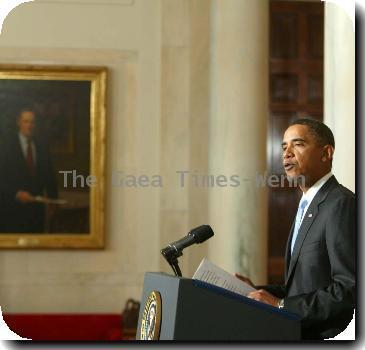White House spending plan features record $1.6 trillion deficit and new effort to boost jobs
By Martin Crutsinger, APMonday, February 1, 2010
Obama to veil $3.8T budget with massive deficits
WASHINGTON — President Barack Obama is sending Congress a $3.8 trillion budget on Monday that will increase spending in the fight against high unemployment, boost taxes on the wealthy and freeze spending for a number of government programs.
The deficit for this year would surge to a record-breaking $1.6 trillion, according to a congressional official who had access to a White House summary document. That deficit would easily top last year’s then unprecedented $1.41 trillion gap.
The congressional source, who spoke on condition of anonymity before the budget’s official release, said the deficit would remain above $1 trillion in 2011 and would average 4.5 percent of the economy over the next decade, a level that economists consider a threat to long-term economic prosperity.
In an effort to address the deficit, the president’s budget would institute a three-year budget freeze on a variety of programs outside of the military and homeland security as well as increasing taxes on energy producers and families making more than $250,000.
To support the pledge in his State of the Union address to make job creation his top priority, Obama was putting forward a budget that included a $100-billion jobs measure that would provide tax breaks to encourage businesses to boost hiring as well as increased government spending on infrastructure and energy projects.
After a protracted battle on health care dominated Obama’s first year in office and led to a string of Democratic election defeats, the administration is hoping that its new budget will convince Americans the president is focused on fixing the economy.
Even before the budget arrived on Capitol Hill, Republicans complained about Obama’s proposed tax increases and said the huge projected deficits showed he had failed to get government spending under control.
“I don’t think anybody in the country thinks we have a problem because we tax too little. I think the problem is we spend too much,” Senate Republican Leader Mitch McConnell said Sunday.
But administration officials argued that Obama inherited a deficit from President George W. Bush’s Republican administration that was already topping $1 trillion when he took office, and given the severity of the downturn, the president had to spend billions of dollars stabilizing the financial system and jump-start growth.
Much of the spending surge over the past two years reflects the cost of the $787 billion economic stimulus measure that Congress passed in February 2009 to deal with the worst economic downturn since the Great Depression. The surge in the deficits reflects not only the increased spending but also a big drop in tax revenues, reflecting the 7.2 million people who have lost jobs since the recession began and weaker corporate tax receipts.
The administration’s $100 billion proposed jobs measure would be lower than a $174 billion bill passed by the House in December but far higher than a measure that the Senate could take up as early as this week.
Obama’s new budget attempts to navigate between the opposing goals of pulling the country out of a deep recession and getting control of runaway budget deficits.
On the anti-recession front, Obama’s new budget proposed extending the popular Making Work Pay middle-class tax breaks of $400 per individual and $800 per couple through 2011. They were due to expire after this year. The budget also proposes making $250 payments to Social Security recipients to bolster their finances in a year when they are not receiving the normal cost-of-living boost to their benefit checks because of low inflation. Obama will also seek a $25 billion increase in payments to help recession-battered states.
In a bow to worries over the soaring deficits, the administration proposed a three-year freeze on spending beginning in 2011 for a wide swath of domestic government agencies. It would save $250 billion over the next decade by following the spending freeze with caps that would keep increases after 2013 from rising faster than inflation.
Military, veterans, homeland security and big benefit programs such as Social Security and Medicare would not feel the pinch. Federal support for elementary and high school education would get a big increase as would the Pell Grant college tuition program, which would see an increase of $17 billion to just under $35 billion, helping an additional 1 million students, according to an administration official who spoke on grounds of anonymity before the budget was released.
NASA’s mission to return astronauts to the moon would be grounded with the space agency instead getting an additional $5.9 billion over five years to encourage private companies to build, launch and operate their own spacecraft for the benefit of NASA and others. NASA would pay the private companies to carry U.S. astronauts.
Obama’s budget repeats his recommendations for an overhaul of the nation’s health care system even though prospects for passage of a final bill have darkened given the loss of a Democratic Senate seat in Massachusetts in a recent special election, depriving Obama’s party of the votes needed to break a Republican filibuster.
Presidential press secretary Robert Gibbs insisted Sunday on CNN’s “State of the Union” that the push for health care was “still inside the 5-yard line” but McConnell said the public was overwhelmingly against the bill and the administration should “put it on the shelf, go back and start over.”
In addition to the freeze on discretionary nonsecurity spending, Obama is proposing to boost revenues by allowing the Bush administration tax cuts of 2001 and 2003 to expire at the end of this year for families making more than $250,000 annually. Tax relief for those less well-off would be extended.
Associated Press writers Andrew Taylor, Seth Borenstein and Darlene Superville contributed to this report.
Tags: Barack Obama, Government Programs, Health Care Reform, North America, Personnel, Political Issues, Recessions And Depressions, United States, Us-budget, Washington



